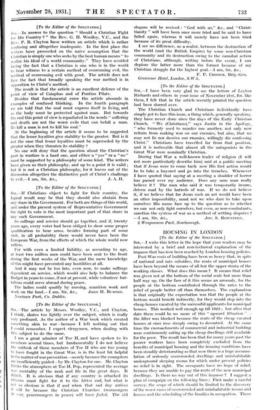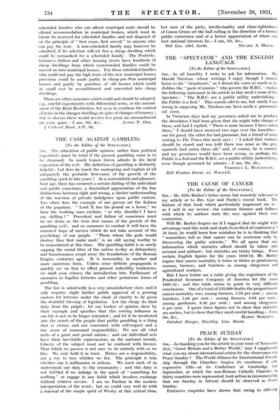HOUSING IN LONDON
[To the Editor of the SPECTATOR.] SIR,—I write this letter in the hope that your readers may be interested by a brief and non-technical explanation of the impasse that has now been reached by London housing policies.
Post-War costs of building have been so heavy that, in spite of national and rate subsidies, the rents of municipal houses have been beyond the means of all but the upper strata of the working classes. What does this mean ? It means that relief was given not at the bottom of the social scale but more than half way up. On the face of it this seems an anomaly, for the people at the bottom contributed through the rates to the relief of people better oft than themselves. The explanation is that originally the expectation was that the people at the bottom would benefit indirectly, for they would step into the cheap houses vacated by the successful applicants for municipal houses. This worked well enough up till 1923 ; but after that date there could be no more of this " upward filtration "-- the filter was blocked because the rents of the cheap vacated houses at once rose steeply owing to decontrol. At the same time the encroachments of commercial and industrial building were continuously eating up the cheap dwellings still available for the poor. The result has been that for many years past the poorer workers have been completely excluded from the benefits of municipal housing and the housing conditions have been steadily deteriorating so that now there is a huge accumu- lation of seriously overcrowded dwellings and uninhabitable underground sleeping rooms for which under present policies no relief is in sight. The occupants have no hope of relief, because they are unable to pay the rents of the new municipal dwellings. Is there no way out of this impasse ? I suggest a plan of campaign on the following lines : First make a careful survey, the scope of which should be limited to the discovery of the worst cases of overcrowded and uninhabitable rooms and houses and the scheduling of the families in occupation. Those
scheduled families who can afford municipal rents should be offered accommodation in municipal houses, which must in future be reserved for scheduled families and not disposed of on the principle of " first come, first served " to anyone who can pay the rent. A non-scheduled family may however be admitted, if its selection will set free a cheap dwelling which could be earmarked for a scheduled family. The Peabody, Guinness, Sutton and other housing trusts have hundreds of cheap dwellings from which overcrowded families could be moved on into municipal houses. For those scheduled families who could not pay the high rents of the new municipal houses provision could be made partly in cheap pre-War municipal houses and partly by purchase of old houses which could at small cost be reconditioned and converted into cheap d well logs.
There arc other measures which could and should be adopted, e.g., careful experiments with differential rents, or the amend- ment of the Rent Restriction Act so as to continue the control of rents in the cheaper dwellings in spite of changes of tenancy ; but to discuss these would involve too great an encroachment







































 Previous page
Previous page